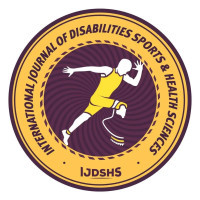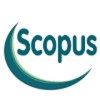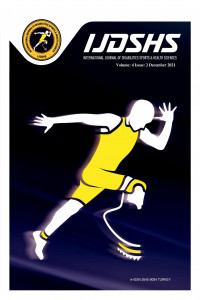Research Article
Aim & Scope
International Journal of Disabilities Sports and Health Sciences (IJDSHS) is an internationally recognized multidisciplinary scientific journal. It aims to showcase a wide range of scientific publications in the field of sports sciences from all over the world and provide an open view of the results of research and an opportunity to deepen knowledge in the field of sports and health sciences for the disabled. The content of IJDSHS reflects different subjects, disciplines, research methods and cultural perspectives. It has a truly international perspective with the contribution of developed and developing countries. The editor invites you to publish articles on all aspects of theory, research and practice in the fields of sports, special needs individuals and health sciences free of charge in this journal. IJDSHS is a double peer-reviewed (blind) OPEN ACCESS JOURNAL that publishes professional level research articles and subject reviews exclusively in English
Ethical Committee Approval in Research
With the ULAKBİM decision dated February 25, 2020, "ETHICAL COMMITTEE APPROVAL” must have been obtained for all disciplines (including social sciences), this approval must be stated and documented in the article" is stipulated. It is important that the authors who will send articles to our journal pay attention to this issue.
Editor-in-Chief : Doç. Dr. Nevzat DEMİRCİ
Publication: June
and December
International Journal of Disabilities Sports and Health Sciences (IJDSHS) is an internationally recognized multidisciplinary scientific journal. It aims to showcase a wide range of scientific publications in the field of sports sciences from all over the world and provide an open view of the results of research and an opportunity to deepen knowledge in the field of sports and health sciences for the disabled.
IJDSHS is a double peer-reviewed (blind) OPEN ACCESS JOURNAL publishes professional level research articles and subject reviews exclusively in English
Editor-in-Chief : Doç. Dr. Nevzat DEMİRCİ
Publication: June and December
IJDSHS has open access and will
publish research and articles in the following areas:
Public Health
Aging and Health
Disability and Health
Sports and Health
Quality in Healthcare
Sports Training in Disabilities
Physical Education and Sports in Disabilities
Individuals with Special Education Needs
Sports And Health Sciences
Physical Activity
Health And Fitness
Physical therapy and rehabilitation
Physical Therapy
Exercise Physiology
Sports for all
Author Guidelines
Authors Guidelines
All research articles in this journal will be subject to a rigorous peer review based on double blind equilibrium by at least two expert referees passing through the chief editor's scrutiny. The final publication decision is the responsibility of the chief editors. Find out what happens during peer review and read our publication ethics.
Authors have to submit the "Copyright Form" with a signature.
Preparing Your Paper
International Journal of Disabilities Sports and Health Sciences Journal Writing Rules and sample article template click here to access.
Ethical Principles and Publication Policy
Open access (OA) journals are scholarly journals that are available online "without financial, legal, or technical barriers other than those inseparable from gaining access to the internet itself.” Open Access (OA) provides unlimited access and reuseability of research publications online for free. Therefore, the open access therefore creates the network for reaching the widest possible audience, sharing the entire papers and building upon them.
International Journal of Disabilities Sports and Health Sciences (IJDSHS) has signed the Budapest Open Access Initiative and shows its “openness” clearly in a standardized form.
IJDSHS also supports the Budapest Open Access Initiative definition of ''Open Access,'' which is defined as: “Its free availability on the public internet, permitting any users to read, download, copy, distribute, print, search, or link to the full texts of these articles, crawl them for indexing, pass them as data to software, or use them for any other lawful purpose, without financial, legal, or technical barriers other than those inseparable from gaining access to the internet itself. The only constraint on reproduction and distribution, and the only role for copyright in this domain, should be to give authors control over the integrity of their work and the right to be properly acknowledged and cited.”
Articles published in IJDSHS will be Open-Access articles distributed under the terms and conditions of the Creative Commons Attribution License
Ijeg is licenced by Creative Commons Attribution-ShareAlike 4.0 International License.
The LOCKSS system has permission to collect, preserve, and serve this Archival Unit.
International Journal of Disabilities Sports and Health Sciences (IJDSHS) is using the LOCKKS archiving system.
The LOCKSS Program, based on the program used at Stanford University Libraries, provides libraries and publishers with award-winning, low-cost, open source digital preservation tools to preserve and provide access to persistent and authoritative digital content.
The LOCKSS Program (https://www.lockss.org/) is an open-source, library-led digital preservation system built on the principle that “lots of copies keep stuff safe.” The LOCKSS Program develops and supports libraries using an open source peer-to-peer digital preservation software.
The LOCKSS system allows librarians to access to the e-content to which they subscribe, restoring the print purchase model with which librarians are familiar.
The Global LOCKSS Network preserves today's e-journals and e-books for tomorrow's readers. The Global LOCKSS Network is a proven preservation approach that uniquely empowers both libraries and publishers. It enhances a library's value by restoring library collections via a locally installed "LOCKSS box", which is essentially a digital bookshelf. The Global LOCKSS Network enhances a publisher's value by preserving the original published artifact, including branding, historical context, and underlying files. It protects the publisher's interest by driving all reader traffic to their web site. The Global LOCKSS Network is administered and managed by the Stanford University Libraries LOCKSS Program. See the LOCKSS Program website for additional information, http://www.lockss.org/lockss/Home.
A detailed explanation of what sets the LOCKSS software apart and how preservation works in the LOCKSS network (e.g. technical infrastructure, security) can be found in the following link: https://www.lockss.org/about/how-it-works/.
Price Policy
IJDSHS is a double peer-reviewed (blind) OPEN ACCESS JOURNAL that publishes professional level research articles and subject reviews exclusively in English
Indexes
Citation Indexes
Other Indexes
Journal Boards
Publisher

NDP Academic Publishing (NDPAP) was founded in 2023 in Mersin, Turkey, with the main goal of promoting open scholarly exchange among all disciplines. NDPA Publishing is a publisher of peer-reviewed, scientific open access journals that supports a fast and rigorous article processing and editing process. As an advocate of open access, we believe strongly in the power of disseminating knowledge. We provide comprehensive resources and guidance to facilitate a smooth and successful publishing journey. Our expert team is here to guide you at every stage, from article submission to post-acceptance processes.
Scientific Publication Coordinator

Editor-in-Chief

Section Editors
1. Education and Training
1983.03.01~1897.02.26 . Bachelor of Physical Education, Seoul National University.
1987.03.01~1989.02.25. Master's Degree in Education, Seoul National University.
1998.03.01~2001.02.23. Doctor of Science, Dankook University.
2009.03.01~2010.02.23. BA in Literature(Child Studies Major), National Institute for Lifelong Education.
2. Career History
2006.03~Up to now. Professor of Department of Leisure Sports and Studies. Dean of the College of Culture, Arts and Physical Education. Director of Lifelong Education Center, etc.
2021.01~Up to now. Vice President of the University.
2019.01~up to now. President of Wholeness Health Movement Association
2014.01~2017. 01. President and Editor-in-Chief of the Korean Dance Science Society.
2017.01~2018. 12. Vice President and Editor-in-Chief of the Korean Society for Sports Sociology
3. Publications
Kim YM, Gong MW. "Differences in Education and Sports Activities Expectations of Korean and Chinese Parents for Athletes’ Children According to Environmental Characteristics of Student Athletes", Journal of Culture and Convergence, Vol. 12, No. 44, 939-953, Decemeber 2022. https://doi.org/10.33645/cnc.2022.12.44.12.939.
Kim YM, Seo SJ. "Influence of Sports Activities on Community Consciousness and Peer Attachment of Children in Regional Community Child Center", Turkish Online Journal of Qualitative Inquiry, Vol.3, No 12, 3178-3191, 2021.
Kim YM, Yang JS. “The Analysis on Sport Emotion Typeby Sport Game Characteristics: with Social Big-Data”, Digital Convergence Research, Vol 7, No 19, 371-377. July 2021.
Kim YM, Kim JD. “The Possibility of Sport Leaders Cooperative Model Promote Life Sport”, Digital Convergence Research, Vol 6, No 19, 363-372. June 2021.
Kim YM. “Analysis of Types and Meaning of ‘Good Leisure’ Perceived by Married Immigrant Women of Korea”, Journal of the Korean Convergence Society, Vol. 2, No 11, 323-330. Feb. 2020.
Kim YM, Seo SJ. "The Effect of Sports Activity of Regional Child Center's on Emotion Regulation, Peer Status and Physical Self-Efficacy", International Journal of Innovation, Creativity and Change, Vol. 7, No 7, 230-243, Novemeber 2019.
Kim YM, Hong HJ. “Effect of Creative Rhythmical Movement Program on Perceptional Motor Ability, Emotional Experience and Facial Emotion Recognition Ability of Adults with Developmental Disability”, Research Journal of Pharmacy and Technology, Vol 3, No 12, 1031-1038. March 2019.
Kim, YM, Lee WH. “Effect of Participation in Taegkyeon on Peer Status and Problem Behaviors of Infants”, Indian Journal of Public Health Research & Development, Vol 9, No 9, 184-190. Jan 2018.
Kim YM, Hong HJ, “The Effects of ‘Physics, Let’s Dance’, as an Integrated Dance Art Education Program Related to Science Subject, on the Personality and Creative Thinking Ability of Elementary School Students”, Indian Journal of Science and Technology, Vol 9, No. 29, 1-6, DOI: 10.17485/ijst/2016/v9i29/94754, August 2016.
Kim YM, Cho JY, “Influence of Dance Visualization of Dance Majoring University Students on Dance Immersion and Dance Performance Anxiety”, Indian Journal of Science and Technology, Vol. 9, No. 25, 1-10, DOI: 10.17485/ijst/2016/v9i25/97225, July 2016.
Kim YM, “The Influence of Liberal Dace Participation Satisfaction on Physical Self-Efficacy and Dance Involvement Intention of Female University Students”, International Journal of Applied Engineering Research, Vol. 10, No. 90, 228-232, 2015.
Kim YM, Lee JK, Hong HJ, “Analysis on the Experience of "Traditional Songs Movement Play" for Multi-Cultural Children”, Official Journal of Korean Society of Dance Science, Vol. 31, No. 1, 1-17, 2014.
Kim YM, Lee YC, “The Influence of Spacial Changes and Movement on Dance Stage on Emotional Responses”, Official Journal of Korean Society of Dance Science, Vol. 29, 1-14, 2013.
Kim YM, “A Close Examination of Drug Use and the Factors Affecting Drug Use Experience of the Female University Students Majoring in Dance”, Korean Journal of Physical Education, Vol. 52, No. 1, 59-71, 2013
Kim YM, “A Study on the Role and Activation Plan of Community Dance for Citizens` Welfare”, Official Journal of Korean Society of Dance Science, Vol. 25, 53-70, 2011.
Kim YM, Shin MH, Han HW, “The Relationship Among Interaction with Physical Activity Teacher, Problem Behavior, and Play Behavior of Infant”, Korean Journal of Physical Education, Vol. 49, No. 5, 37-47, 2010.
Kim YM, Han HW, “The Influence of Flow Experience on Self Efficacy and Satisfaction with Dance Activity of University Students Majoring in Dance”, Official Journal of Korean Society of Dance Science, Vol. 19, 1-18, 2009.
Kim YM, Hyeon SH, “Analysis of Hypothetical Causal Model on the Career Preparation Behavior of College Student Majoring in Dance”, Journal of Sports Sociology, Vol. 20, No. 3, 503-519, 2007.
Kim YM, “The Relationship between Sociocultural Attitudes toward Appearance and Body Image Dysmorphic Symptom of Dancers”, Korean Journal of Physical Education, Vol. 46, No. 1, 123-134, 2007.


Soon Kwon Park
Address: 112-1301, 30 Padongro 30-gil , Susung-gu, Daegu, South Korea
Cell Phone: 82-10-8982-9680
Email: sopark@jj.ac.kr
Work Experience
09/2023 ~ present
Professor Emeritus, Dept. of Counseling Psychology, Jeonju University
03/2015 - 08/2023
Professor, Dept. of Counseling Psychology, Jeonju University
03/2007 - 02/2015
Professor, Dept. of Alternative Medicine, Jeonju University
09/2000 - 02/2007
Research Professor, Dept. of Anatomy, Korea University
07/1998 – 06/2000
Postdoctoral Research Fellow, University of Texas Medical Branch
Education
08/1994 - 02/1998
Ph. D. in Biological Psychology, Korea University
03/1986 - 02/1988
Master’s Degree in in Biological Psychology, Yeoungnam University
03/1979 - 02/1986
Bachelor of Art in Psychology, Yeoungnam University
Academic Activity
Korean Society of Intervention (full membership and director)
Society for Neuroscience (full membership)
Korean Psychological Association (full membership and director)
Korean Health Psychological Association (full membership)
Korean Addiction Psychological Association (full membership and director)
Korean Convergence Society: Wellness subdivision (full membership and director)
Research Interests
Psychosomatic Approach to Health Care
Neuroscience of Learning and Memory
Neurobiology of Stress Response
Neurobiological Mechanism of Neuropathic Pain

I am staff member of Faculty of Sports Science, State University of Malang, Indonesia.


After completing her undergraduate education at Abant İzzet Baysal University, Faculty of Education, Department of Special Education in 2008, she completed her master's degree in the same university in the field of Education of the Intellectual Disabilities in 2012. After working as a teacher in a private institution in Bolu between 2008-2010, she started to work as a research assistant at Gaziosmanpaşa University, Faculty of Education, Department of Special Education in 2010. In 2012, she was appointed to Anadolu University Faculty of Education, Department of Special Education, where she is still working. In 2019, she received her doctorate degree in Anadolu University Institute of Educational Sciences in the field of Education of the Intellectual Disabilities and in 2023 she received the title of assistant professor doctor.

Şule Demirel Dingeç, who works in the Department of Education for the Gifted at Anadolu University's Faculty of Education, completed her master's and doctoral degrees in the field of gifted education. She has also earned her associate professorship in the same field. Her research focuses on the identification of gifted students, educational differentiation, character development, values education, the sociocultural dimensions of giftedness, and the families of gifted individuals.

Physioterapyst, Master in Health and Sports Sciences, Doctor in Physical Activity Sciences. Associate Professor of the school of kinesiology at Santo Tomás University. Researcher in the lines of analysis of human movement and physical activity with more than 150 published scientific articles.
Editorial Board





 Web
Web
Dan Alexandru SZABO (ORCID ID: 0000-0002-7326-212X; WoS Researcher ID: AAD-5538-2019): associate professor at the George Emil Palade University of Medicine, Pharmacy, Science, and Technology of Targu Mures, 38 Gheorghe Marinescu Street, Targu Mures, 540142; https://www.umfst.ro. Department M2: Faculty of Medicine. Has completed his PhD in Human Movement Sciences, published more than 80 papers, also in ISI journals, nine books, being an editorial board member and scientific reviewer for reputed ISI journals, with more than 200 reviews to his credit. Science fields: kinesiology, psychomotor activity, proprioception, biomechanics, kinetics and kinematics, instructional design, medical technology, medical rehabilitation, motor behaviour, physical activity, motor skills, and human movement.

GAZİANTEP ÜNİVERSİTESİ, SAĞLIK BİLİMLERİ FAKÜLTESİ, BESLENME ve DİYETETİK BÖLÜMÜ


Dr. IL-YOUNG CHO is currently a professor in the Department of Exercise Prescription at the College of Medical Sciences, Jeonju University. He also holds a professorship at the Graduate School of Complementary and Alternative Medicine at the same university.
Dr. CHO began his professional career in 1996 as an Exercise Prescription Intern at Asan Medical Center, where he gained valuable experience in clinical exercise physiology. This early experience contributed to his foundation in medical science and alternative therapy.
From 2018 to 2021, Dr. CHO served as the Chief of the Ceragem Institute for Spinal Science/Medical Science. Since 2010, he has been the Director and Advisory Member of the Ceragem Alternative Medicine Research Institute.
In 2006, he was a professor in the Department of Alternative Therapy at Gwangju Women's University. From 2001 to 2005, he served as the Vice-President of Suwon Seryu Neuroscience Clinic and other clinics, significantly contributing to the field of neuroscience and medical administration.
Dr. CHO has held various positions in academic and professional organizations. He was the Director of the Institute of Alternative Medicine at Jeonju University from 2012 to 2017 and served as the Deputy Editor of the International Journal of Health Care and Information Technology in 2016. His editorial contributions extend to the Korea Digital Policy Association, where he served as Deputy Editor from 2015 to 2020 and as Editor in Chief since 2021.
From 2015 to 2021, Dr. CHO was the Chairman of the WT Subcommittee of the Korean Convergence Society and has been the Program Chair for the International Conference on Digital Policy & Management (ICDPM) since 2015. He also served as an editor for the Korean Journal of Physical Education from 2015 to 2016.
His dedication to healthcare is reflected in his roles as a Director of the Korean Developmental Disabilities Association since 2008 and the Korea Psychosomatic Movement Society. From 2010 to 2013, he was an Advisory Board Member of the National Assembly Supplemental Alternative Medicine Policy Committee under Congressman Kim, Choon-Jin.
Since 2022, Dr. CHO has been serving as an Evaluation Committee Member of the Korea Medical Dispute Mediation and Arbitration Agency, and since 2020, he has been a Deliberation Committee Member of the Food Sanitation Advisory Committee for the Korea Ministry of Food and Drug Safety.


Physical Education, Sport and Physical Activity for Disabled People Physical Education and Play

Dr. Valentina Ștefănică is an Associate Professor at the Faculty of Sciences, Physical Education, and Informatics, Department of Physical Education and Sport at the Politehnica University of Bucharest, Pitești University Center. Her scholarly work includes several notable books such as "The Environment and Organizational Culture in Sports" (2013), "Entrepreneurship in Sports - A Solution for Former Performance Athletes" (2020), and "Sport Marketing" (2023). She has contributed chapters to international publications on topics such as post-pandemic sports preparation and recovery techniques for athletes.
Her research articles are indexed in various databases, with recent publications focusing on the effects of kin ball on muscle strength and endurance, as well as exploring entrepreneurial intentions among sports students. Dr. Ștefănică has also been involved in numerous research and development projects, including Erasmus+ programs and inclusive education initiatives.
In terms of research and development, Dr. Ștefănică has been involved in several projects, including:
2024: Project Coordinator for ERASMUS+ FOR HIGHER EDUCATION, KA131 (2021-2027), focusing on "Leisure Time - Mountain Activities and Teambuilding."
2022-2023: Director of the research project "Development of Inclusive Education of Institutionalized Children through Adapted Psychomotricity."
2019-2021: Director/beneficiary of the Kidsano Romania project in extracurricular marketing activities.
2023: Expert in the Erasmus project "Walking in the Path of Giving: Taking Action for Solidarity, Sustainability, an Inclusive Society, and a Fairer World."
2023: Member of the project "Designing, Testing, and Validating an Innovative Team Building Product for Enhancing Organizational Performance."
2022: Consultant for entrepreneurs in the project "Integrated Activities and Measures for Educational Assistance, Entrepreneurial Counseling, and Mentoring."
Dr. Ștefănică has been actively involved in various professional committees and scientific conferences:
2021: President of the Management Section at the International Scientific Conference “Perspectives in Physical Education and Sport.”
2014-2023: Member of the organizing committee for the Student Scientific Session.
2010-2018: Member of the organizing committee for the International Conference on Physical Education, Sport, and Health.
She has also served as a keynote speaker at several international conferences and workshops, including those focusing on sports entrepreneurship and volunteer management.
Dr. Ștefănică is a member of professional organizations such as the International Council of Sport Science and Physical Education (ICSSPE) and the Romanian Council of Sports Science. Her contributions to the field have been recognized with awards and roles in various projects that aim to advance sports education and management.




 Web
Web
Child Development, Motor Development, Social Development, Developmental Disabilities, Inclusive Education, Learning Disabilities.


She graduated from Çukurova University, Faculty of Education, Department of Physical Education and Sports with a degree. She completed her master's thesis in Çukurova University Faculty of Medicine, Department of Physical Medicine and Rehabilitation with the title "Evaluation of respiratory and exercise capacities of allergic asthmatic children with different activity levels".
She completed her doctoral thesis in the field of Physical Education and Sports at Çukurova University, Faculty of Education, Department of Physical Education and Sports with the title "Effects of education and exercise programmes on disease activity and functional status in patients with ankylosing spondylitis".
He has been working in the field of sports in the disabled for about 20 years. He participated in many trainings on sports in the disabled both as a participant and as an invited speaker. These trainings; courses for the sensory development of individuals with disabilities (Sherborne Developmental Movement Education 1-2) and physical education and sports in disabilities, motor development seminars in disabilities, etc. In addition, goalball for the visually impaired, sitting volleyball for the physically disabled, etc. He also has certificates from coaching courses. He has book chapters in many national/international books, articles, papers, journal referees, book editors, panelists and external consultants within TÜBİTAK, especially in the fields of special athletes (attention development in sports, attention deficit and hyperactivity disorder, autism spectrum disorder, down syndrome, mental retardation). He also worked as a trainer in many projects in the field of disabilities. Some of them are; The EU project titled "Sports for Disabled-Enable to Participate" with the number 2008-1-PT1-LEO05-004020 in which 5 countries (Portugal, Spain, Turkey, Finland, Bulgaria) were involved within the scope of Leonardo da vinci Transfer of Innovation in 2009 and the project titled "Autism Spectrum Disorder and Motor Skills" within the scope of TÜBİTAK 2237-A for 2 times in 2020-2022. In recent years, he has been working intensively on the subject of "The Importance of Physical Activity in Individuals with Attention Deficit and Hyperactivity Disorder", which he has chosen as his speciality. He has carried out about 15-20 projects within the scope of sports course in disabled people. There are currently 10 doctoral and 3 master's students.


She graduated in 2008 at the Institute of Special education and rehabilitation, obtained a master's degree in 2012 (master thesis: Socioeconomical status of families with disabled child) and a doctorate in 2014 at the Faculty of Philosophy at the University "St. Cyril and Methodius” in Skopje. After defending her doctoral dissertation on the topic: "Specific learning problems in people with disabilities" she obtained a scientific degree - Doctor of Special Education and Rehabilitation Sciences.
For a period of 7 years, from 2010 to 2017, she worked as a special educator and rehabilitator, as well as coordinator of the Day Care Center for Persons with Mental or Physical Disabilities.
From 2015 to 2018 she worked as a lecturer in various subjects at the Institute for Special Education and Rehabilitation at the Faculty of Pedagogy, University of Tetovo, Republic of North Macedonia.
Since December 2018 she has been employed at the Faculty of Philosophy in Skopje at the Institute for Family Studies, as an associate professor in the fields of: Education, Special Education and Rehabilitation (Family and Disability, Special Education and Families, Family and Developmental Disabilities).
EDUCATION AND TRAINING
Family consoler - unformal education European Family Therapy
Address 1000, Skopje Website http://institutalternativa.mk/?page_id=24
14/01/2021 – 30/03/2021
Policy engagement, Science engagement program - unformal
Website https://www.britishcouncil.mk/en
02/06/2022 – 08/07/2022 Online
Evidence-based Practices in Early Childhood Intervention - unformal education Eur lyAid and UNICEF
LANGUAGE SKILLS
MOTHER TONGUE(S): Macedonian
Other language(s):
English
Listening C1 Spoken production C1
Reading C1 Spoken interaction C1
Writing C1
Levels: A1 and A2: Basic user; B1 and B2: Independent user; C1 and C2: Proficient user
DIGITAL SKILLS
Microsoft Office Microsoft Word Microsoft Powerpoint Social Media Google Drive Microsoft Excel SP SS Statistical Tool Wordpress - Basic Knowledge Excellent Knowledge of Canva Website create Basic knowledge in Design and photo/video editing.
PUBLICATIONS
2024
Современото македонско семејство
Monography: Радуловиќ, М., Авировиќ Бундалевска, Ирена., Кескинова А. Современото македонско семејство, Здружение за семејна поддршка ЕСТИА, 2024 ISBN 978-608-67162-0-2, COBISS.MK-ID 62704389 Скопје
2024
Changes in the structure of the Macedonian family (Research on young people’s perceptions of their family of origin)
Radulovic, Makedonka, Avirovic Bundalevska, Irena, & Keskinova, Angelka. 2024. ,,Changes in the structure of the Macedonian family (Research on young people’s perceptions of their family of origin)”. во International Journal of Social Sciences “VISIONS“, Grafiotex, Skopje, Issue No 42 Skopje, ISSN: 1409-8962- printed form; ISSN 1857- 9221- electronic form.
2023
Support and education for families of children with disabilities: exploring parental perspectives and recommendation.
Keskinova A., (2023). Support and education for families of children with disabilities: exploring parental perspectives and recommendation. Annuaire, vol.76:843-865, Skopje. ISSN 0350-1892
2023
Situation Analysis on Early Childhood Intervention in North Macedonia
Karovska Ristovska, A., Filipovska M., Ajdinski,G., Chichevska-Jovanova, N., Dimitrova-Radojichikj, D., Rashikj-Canevska, O., Stanojkovska-Trajkovska, N., Keskinova, A., Gjeorgjievska, A., Dukovska, V., Kostadinovska E., Kakabadze, N., Diehl, K., Vargas-Barón, E. (2023) Situation Analysis on Early Childhood Intervention in North Macedonia, UNICEF, Republic of North Macedonia, ISBN ENG 978-608-4787-93-8
2023
Перцепции за бракот и разводот на младите во Република Северна Македонија,Перцепции за бракот и разводот на младите во Република Северна Македонија,
Monography: Авировиќ-Бундалевска, И., Радуловиќ. М., Кескинова. А. (2023) Перцепции за бракот и разводот на младите во Република Северна Македонија, Филозофски факултет, Св.Кирил и Методиј, Скопје ISBN: 978-608-238-230-2
.
2023
Challenges Faced by Parents of Children with Disabilities
Keskinova, A., Ajdinski G., (2023) Challenges Faced by Parents of Children with Disabilities: Implications for Comprehensive Treatment and Support. 6th International Conference on Social Science Research, Budva, Monte Negro, pp. 37-42, ISBN. 978-625-98911-2-5
2023
Research for Best Practices of Inclusion of Adults with Disabilities on the Labor Market
Monography: Rizova, E., Keskinova, A., Georgievska, S., Stanojkovska Trajkovska, N., Demetriou, K., Borges, F., ... & Lazova, L. (2023). Research for Best Practices of Inclusion of Adults with Disabilities on the Labor Market ISBN: 978-608-245-848-9
2023
Enhancing Employment Opportunities for Persons With Disabilities: the Importance of Inclusive Strategies and Innovative Tools
Keskinova, A., Rizova, E., Stanojkovska-Trajkovska, N., Georgievska, S., Minov, N. (2023). "Enhancing Employment Opportunities for Persons With Disabilities: the Importance of Inclusive Strategies and Innovative Tools". In 6. меѓународна научна конференција 30 години студии по Специјална едукација и рехабилитација. Скопје: Филозофски факултет, pp. 566-582. ISBN 978-608-238-237-1
2022
Adaptation of Students to Distance Learning During the Covid 19 Pandemic. Educational Challenges and Future Prospects
Keskinova, A., Avirovic Bundalevska, I., Radulović, M. (2022). Adaptation of Students to Distance Learning During the Covid 19 Pandemic. Educational Challenges and Future Prospects: Conference Proceedings. International Scientific Conference - 75th Anniversary of the Institute of Pedagogy – Educational Challenges and Future Prospects, Ohrid, 16-18 May 2022. Skopje: Institute of Pedagogy / Faculty of Philosophy, Ss. Cyril and Methodius University in Skopje, pp. 265-272
2022
Drawing skills in students with mild intellectual disability
Keskinova, A., Ramo Akgün, N. (2022). Drawing skills in students with mild intellectual disability. HAYEF: Journal of Education., 19(2), 114-121. DOI: 10.54614/hayef.2022.21049
2021
Distance learning in higher education during COVID-19: The role of basic psychological needs and intrinsic motivation for persistence and procrastination
Pelikan ER, Korlat S, Reiter J, Holzer J, Mayerhofer M, Schober B, et al. (2021). Distance learning in higher education during COVID-19: The role of basic psychological needs and intrinsic motivation for persistence and procrastination – A multi-country study. PLoS ONE , DOI: 10.1371/journal.pone.0257346
2021
Family Support in the Republic of North Macedonia
Avirovic Bundalevska, I., Radulovic, M., Keskinova, A. (2021) Family Support in the Republic of North Macedonia. Postmodernism Problems 11 (2). pp.157-169., ISSN: 1314 – 3700., DOI: 10.46324/PMP2102157
2021
Accessible museums
Keskinova A., Troshanska J., Ramadani Rasimi T. Georgievski P, (2021). Accessible museums. International Scientific and Practical Conference “Current trends and prospects of international tourism”, Macedonia,
pp. 27-35, ISBN 978‐608‐4872‐11‐5
2021
Financial challenges of family of disabled children
Keskinova A., (2021). Financial challenges of family of disabled children. International Conference of the Occasion of the Centennial of the Faculty of Philosophy in Skopje., Science and Society: Contribution of Humanities and Social Sciences. pp.695-707., ISBN 978-608-238-199-2, COBISS.MK-ID 53318149
2021
Пристапност во туризмот: патувања на лицата со попреченост
Monography: Методијески.Д., Филипоски. О., Кескинова. А., Џамбазовски. К., Талеска. М, Тодоровиќ. Е., Чедомир Димовски. Ч., Мицевски. М., Митева. Е., (2021). Пристапност во туризмот: патувања на лицата со попреченост. Туристика, Скопје ISBN: 978-608-4872-09-2
2021
Specific Learning Problems
Part of the Monography: Keskinova, A. Ramo Akgün, N. (2021). Specific Learning Problems, In Şehriban Koca (Ed). Research and Reviews in Educational Sciences- II. (pp.129-153). Gece Kitaplığı
2021
Students and family functioning during the COVID 19 pandemic, Improving the quality of life of children and youth
Keskinova, A., Radulovic, M., Avirovic Bundalevska, I., Ajdinski., G. (2021). Students and family functioning during the COVID 19 pandemic, Improving the quality of life of children and youth. XI International scientific conference „Improving the quality of life of children and youth”, Bulgaria, pp.333-341
2020
Осврти, рецензии, промоции, кажувања, извештаи, и медиуми за професорот д-р Љупчо Ајдински
Monography: Кескинова А., Осврти, рецензии, промоции, кажувања, извештаи, и медиуми за професорот д-р Љупчо Ајдински, Филозофски факултет, Скопје, 2020
2020
The role of the family educator in early intervention process of children with disability
Keskinova A., (2020). The role of the family educator in early intervention process of children with disability. Annuaire, vol.73: 483-491. https://doi.org/10.37510/godzbo2073483k
2019
Support to families of children with disabilities
Keskinova, A., Radulovic, M., Avirovic Bundalevska, I., Dragovic, I. (2019). Support to families of children with disabilities. Sixth International Scientific Conference: Social Change in the Global World – Proceedings. Stip: University Goce Delcev. pp. 815-826. ISBN 978-608-244-647-9, COBISS MK-ID 110919178
2019
United Nations’ Contribution to Families (Focus on Family International Day)
Radulovic, M., Avirovic Bundalevska, I., Keskinova, A. (2019). United Nations’ Contribution to Families (Focus on Family International Day). Sixth International Scientific Conference: Social Change in the Global World – Proceedings. Stip: University Goce Delcev. pp. 901-912. ISBN 978-608-244-647-9, COBISS MK-ID 110919178
2019
Family and intellectual disability
Keskinova, A., Radulovic, M., Bundalevska Avirovic, I., Dragovic, I. (2019), Family and intellectual disability. International Scientific Conference: 70 years - organized education, rehabilitation and employment of persons with disability in Republic North Macedonia. Bitola: Association of special educators and rehabilitators of RNM, pg. 223-231. ISBN 978-608-65438-6-0
PROJECTS
2021 – 2023
United in Inclusion for employability – UNITY, Erasmus + project
The "United in Inclusion for Employability" project aims to enhance employment prospects for disabled individuals by educating employers and professional staff. It focuses on providing guidance on creating
effective CVs for those with disabilities. The initiative seeks to foster a more inclusive work environment by offering resources and support to both job seekers and providers.e the description...
01/01/2022 – 31/12/2022
Perceptions of marriage and divorce among young people in the Republic of North Macedonia
This study investigated young people's perceptions of marriage and divorce in the Republic of North Macedonia through rigorous data collection and analysis. The research findings were systematically analyzed to identify prevailing attitudes and trends, ensuring the robustness of the conclusions drawn. The culmination of this academic endeavor was the development of a scholarly publication, aiming to enrich the existing literature on marital perceptions within this demographic.
2021 – 2022
Research for National Situation Analyses on Early Childhood Intervention, UNICEF The project embarked on conducting National Situation Analyses concerning Early Childhood Intervention, leveraging both quantitative and qualitative research methodologies to gather comprehensive data. Through meticulous data analysis, the study aimed to synthesize information from diverse sources, enhancing the understanding of the current landscape of early childhood intervention practices. This analytical process was intended to culminate in the development of an extensive report, providing a detailed examination of the findings to inform policymakers and stakeholders in the field.
2021 – 2021
Education for employment in North Macedonia, Detra Center
Functional and training needs analysis of Regional center for vocational education and training - Consulta nt for working with people with disabilities
2021 – 2021
Dyslexia online teaching courses" Erasmus + project
2017 – 2018
USAID and LCIF Children with Visual Impairments Project
Inclusive education coordinator: Coordinating resource centers for visual impairment children in five cities in Macedonia (Skopje, Tetovo, Veles, Shtip, Bitola).
2013 – 2015
Coordination Board for volunteer service, Project - Roma Children Dropout Educator/trainer for Development of educational curriculum - within the project "Inclusion of dropped out and improvement of education process of students from Roma nationality in primary schools"
2014 – 2015
STEP Skills Measurement - research on households, DOO PUBLIK
Coordinator for field research within the project: STEP Skills Measurement - research on companies
2013 – 2015
Conditional Cash Transfers in Republic of Macedonia, DOO PUBLIK
Field coordinator on the project: Subsequent collection of data for evaluation of Conditional Cash Transfers in Republic of Macedonia
2012 – 2014
Support of Roma women to access the labor market in Macedonia, Coordination Board for volunteer service
Educator within the project "Support of Roma women to access the labor market in Macedonia" in Bitola, Republic of Macedonia
2012 – 2014
STEP Skills Measurement, DOO PUBLIK
Project assistant for field research within the project: STEP Skills Measurement - research on households
2012 – 2014
Performance audit of Conditional Cash Transfers, DOO PUBLIK
Research and analysis within the project: Performance audit of Conditional Cash Transfers
Cardiac Rehabilitation, Spinal Cord Injury, Rehabilitation Medicine, Rehabilitation, Neurorehabilitation, Musculoskeletal Disorders, Cardiopulmonary Exercise Testing, Physical Rehabilitation, Stroke Rehabilitation, Sports Injuries, Kinesiology, Movement Analysis


Dr. Özer is graduated from Department of Child Development and Education, Hacettepe University, Ankara. She completed her master thesis on motor performance of preschoolers and her dissertation on motor proficiency of children with intellectual disabilities. She has been teaching motor development, adapted physical education, development and learning for 25 years. She is mentor for eight master thesis and one doctoral thesis. She has published 10 international journal articles, 21 national journal articles, ten chapters of book and has given 33 conference presentations. Dr. Özer taught “ Sherborne Developmental Movement” at the EUDAPA program between 2010-2016. She was visiting scholar in Texas Woman’s University by Claudine Sherrill’s and Lisa Silliman French’s mentorship in 2011. Dr. Özer, specialized on motor development and adapted physical activity has two text books in which these fields are. She was Middle –East Representative of IFAPA between 2007-2011 and president of the ISAPA2013 (www.isapa2013.com). Dr. Özer has implemented many national and international projects which is aiming inclusion of people with disabilities in the society via sports. Lastly she has established Inclusive Adapted Physical Activity Center supported financial by Ministry of Development. Within the scope of the project, about 200 children with special needs, especially with intellectual disabilities and autism, between the ages of 0-24, have been trained in terms of sports and motor skills by an approach including parents since 2013.
.

Assistant Professor at Middle Technical University
Head of Student Activities Division
I hold a Master’s degree in Sport Psychology from Vladimir State University, Russian Federation. I have worked as a coach for two years in a Russian academy specializing in youth age groups. I am also a specialist coach in the field of sports psychology for several professional athletes.
I have conducted several research studies in various sports fields and have served as a reviewer for multiple journals indexed in Scopus. Additionally, I have been the coach of the Middle Technical University football team for three consecutive years. I have also played in the Russian amateur futsal league for four years.






 Web
Web
Dr. Ali Kashi earned his Ph.D. in Motor Development and Learning (Motor Behavior) from the University of Tehran in 2013 and currently serves as an Associate Professor at the Sport Sciences Research Institute (SSRI) of Iran.
He has been a national member of Iran’s National Elites Foundation since 2004 (ranked as a Level 1 Researcher). His contributions as an academic include winning national awards such as Best Student Book Author (twice, at the master’s and doctoral levels), two-time recipient of SSRI’s Top Faculty distinction, and winner of the institute’s Best Industry and Community Engagement Award in both 2023 and 2024.
His international experience includes completing a research fellowship at the National University of Sport in Italy (Foro Italico) in 2012 and receiving a grant for a 45-day training program on disability and sport across three U.S. states in 2015. He served as Head of the Iranian Delegation (HOD) to the 2023 Special Olympics World Summer Games in Berlin and as Deputy Head of Delegation at the 2017 Special Olympics World Winter Games in Austria. He also served as a coach for the Iranian delegation at the Special Olympics World Winter Games 2025 in Turin, Italy. He has presented papers at various international conferences and served as the Scientific Chair of the 12th and 13th International Congresses on Sport Science in Tehran.
At the national and institutional level, he has held key leadership positions such as National Director of Special Olympics Iran since 2015 and President of the ID Sports in National Federation for Sports with Disabilities from 2022 to 2024. At SSRI, he was Vice President for Research and Postgraduate Affairs from 2018 to 2022, and has also served as Director of Graduate Studies and Research. Additionally, he acted as Executive Director of the National Practical Exam for Sports Science for the Iranian University Entrance Organization over three consecutive years (coordinating exams across 36 universities for 40,000 to 70,000 candidates with over 3,000 staff members involved). He has also been Scientific Secretary for two national sport science congresses and served for six years as Head of the Secretariat of the National Coordination Council of Sport Education and Research Centers.
In the research domain, he has led more than 20 projects as Principal Investigator and served as a key collaborator in 15 additional studies. He has authored over 70 scholarly papers, including 15 publications in international peer-reviewed journals, and presented more than 15 papers at international conferences and 20 at national conferences.


Since January 2018, she has been a full professor in the fields of special education, methodology, and orthopedagogy. She has completed study visits and training programs in the Netherlands, Italy, and Bulgaria.
She has served as a member and chair of various professional and academic bodies, including editorial and program boards of national and international conferences and journals. She has also edited proceedings from prominent international events in the field of special education.
She has led postgraduate and doctoral programs in special education and rehabilitation. To date, she has supervised 88 undergraduate theses, 17 master's theses, and 4 doctoral dissertations.
She has contributed to the development of revised curricula for students with intellectual disabilities.
Her research interests include: early intervention, inclusive education, intellectual and motor disabilities, autism, family and children with developmental difficulties, and teaching strategies for students with disabilities.

Language Editors


Özge Gül Zerey completed her Bachelor’s degree in English Language Teaching at Çukurova University. She earned her Master’s degree at Mustafa Kemal University and later received her Ph.D. from Çukurova University. With nearly nineteen years of teaching experience in higher education, she has worked with students from a wide range of academic and cultural backgrounds. She has served at different universities throughout her career and has been teaching at Mersin University, School of Foreign Languages for the past ten years. She has published research on different aspects of foreign language acquisition, including speaking anxiety, writing anxiety and self-directed professional development of EFL instructors. Her current research focuses on language testing and assessment.
Statistical Editor
Master: Abant İzzet Baysal University, Measrement and Evaluation Department
Doctorate: Mersin university, Measrement and Evaluation Department
Mersin University, Medical Education Department







 Web
Web
Araştırma Alanları: Statistics, Applied Statistics, Artificial Intelligenc, Machine Learning, Data Mining and Knowledge Discover
Ethics Editor
Faculty of Medicine (Turkish), Department of Basic Medical Sciences, Department of Medical History and Ethics
Advisory Board




 Web
Web
https://repository.uobaghdad.edu.iq/author/noor.copew

Dan Iulian ALEXE is an associate professor, Ph.D. at the "Vasile Alecsandri" University of Bacau (Romania); he holds the position of Dean of the Faculty of Movement, Sports and Health Sciences in Bacau (from 2020) and earned his PhD in Physical Education and Sport in 2009. His research is focused on physical education in the pre-university, university, and private environment, as well as on increasing human performance in sports. To date, he has published 160 articles (70 are indexed in Web of Science) and 15 specialized books and university textbooks. He has h-index value 10 on Web of Science, his articles accumulating over 600 citations, of which 300 citations are only of articles indexed by Clarivate. He reviewed more than 170 articles for journals indexed in Web of Science/Scopus. He is also an athletics coach.





 Web
Web
Professor at the Faculty of Physical Education and Sport, University of East Sarajevo, East Sarajevo (BIH). His research is focused on Sports and Rehabilitation Sciences. He has published more of 330 articles and 5 university textbooks. Member in Editorial Board about 85 Scientific Journals.
Nörobilim ve Translasyonel Tıp alanında doktora, Önleyici ve Uyarlanmış Fiziksel Aktivite alanında yüksek lisans ve Hukuk alanında LLM derecesine sahibim.
Araştırma alanlarım arasında fiziksel aktivite, beden eğitimi, egzersiz fizyolojisi, vücut kompozisyonu, psikofiziksel sağlığı geliştirme, insan performansı, beslenme, özel eğitim, spor psikolojisi, spor sosyolojisi, spor hukuku, kapsayıcı eğitim, sanal gerçeklik, araştırma metodolojisi ve veri analizi bulunmaktadır. Tüm yaş gruplarından genel nüfusu, öğrencileri, sporcuları, çalışanları ve taktiksel nüfusu kapsar.
Permanent Professor of the Postgraduate Programme in Education / FACED / UFAM. Permanent Professor of the Professional Master's Degree Programme in Physical Education in the National Network (PROEF). PhD in Sciences, in the area of Biodynamics of Human Movement, from the School of Physical Education and Sport at the University of São Paulo (2013). Master's in Physical Education, in the area of Biodynamics of Human Movement, from the School of Physical Education and Sport at the University of São Paulo (2004). Specialisation in Swimming Science and Technique from Faculdades Integradas Castelo Branco (1992). Full degree in Physical Education from the University of Taubaté (1987). Adjunct Professor C Level IV at the Federal University of Amazonas/UFAM. Leader of the Human Motor Behaviour Study Group (LECOMH) at the Faculty of Physical Education and Physiotherapy/FEFF. He has experience in the area of Physical Education, with an emphasis on School Physical Education, working mainly on the following subjects: Motor Development (Coordination Development Disorder); Movement Pedagogy and Inclusive Education.
Translated with DeepL.com (free version)
Physiotherapist, Specialist in Physical Therapy for Critically Ill Adult Patients (UR), Master’s in Sports and Physical Activity Physiotherapy (UNAL), and Ph.D. in Sciences - Biology (UNAL), with a research stay at the Cellular Biology and Immunology Laboratory of the University of Barcelona.
He has extensive experience in clinical care and managing patients with non-communicable chronic diseases. He has served as an undergraduate and graduate professor, academic process leader, and researcher recognized by MINCIENCIAS in the associate category. His research interests focus on physical therapy for critically ill patients, acute and chronic stress responses, exercise physiology, and molecular biology applied to physical therapy.
Dr. Elsayed Elshabrawi Ahmed Hassanein is a professor of Special Education, College of Education at Qatar University. Dr. Hassanein received his PhD from Exeter University, UK in 2010. Dr. Hassanein has an extensive teaching and research experience. Additionally, he supervised a number of MA and PhD theses in the area of Special Education and Mental Health. His research interests cover a wide range of areas such as literacy assessment and remediation, learning disabilities, intellectual and developmental disabilities, inclusive education, teachers’ professional development. He published many research articles in national and international journals. Moreover, he participated in several national, regional and international conferences. Furthermore, Dr. Hassanein has been awarded many research grants from QRNF, (e.g. UREP21-019-5-001; UREP22-160-5-043 and NPRP11S-1211170087) and from Qatar University (e.g. QUHI-24/25-52; QUCP-CED, 24/25-561; and NCBP-464). In 2021, Dr. Hassanein was awarded Sheikh Faisal Bin Qassim Al Thani Award for Educational Research.
Pr (MD, PhD).
Physiology and Functional Explorations.
Master: Biological and Medical Sciences
Diploma: Advanced Studies “Sciences of Human Movement”
Interuniversity Diploma “physiopathology of exercise and functional explorations of effort”
PhD thesis
European Driving License in Spirometry Part 1 and Part 2
Guest speaker *** international conferences
Author: > 300 articles
Reviewer: 100 journals
Professor Helmi BEN SAAD (MD, PhD)
PubMed ScholarGoogle Researchgate Webofscience Mendeley Kudos
MD (Faculty of Medicine of Sousse, Tunisia). PhD (Faculty of Medicine of Montpellier, France). Physiology and Functional Explorations.
.Laboratory of Physiology and Functionnal Explorations. Farhat HACHED Hospital. Sousse, Tunisia
.Laboratory of Physiology. Faculty of Medicine of Sousse. Street Mohamed KAROUI. Sousse 4000. Tunisia.
.Phone: ++216 98697024.
.Email 1: helmi.bensaad@rns.tn
.Email 2: bensaadh@yahoo.fr

Physioterapyst, Master in Health and Sports Sciences, Doctor in Physical Activity Sciences. Associate Professor of the school of kinesiology at Santo Tomás University. Researcher in the lines of analysis of human movement and physical activity with more than 150 published scientific articles.

Sibel NALBANT is an Associate Professor in the Faculty of Sport Sciences at the University
of Alanya Alaaddin Keykubat. Her research interests focus on the inclusion of children with
disabilities in physical education and motor development.

Dr. Ravi Shankar Reddy is an accomplished Associate Professor of Physical Therapy at the Department of Medical Rehabilitation, College of Applied Medical Sciences, King Khalid University, Abha, Saudi Arabia. With over two decades of experience in the field of physiotherapy, Dr. Reddy is renowned for his expertise in manual therapy, particularly in orthopaedic physical therapy. He holds a Ph.D. in Physiotherapy, with a focus on the effectiveness of kinaesthetic rehabilitation exercises on proprioception in individuals with cervical spondylosis, from the prestigious Manipal University, India.
Dr. Reddy’s academic journey began with a Bachelor of Physiotherapy (BPT) and a Master of Physiotherapy (MPT) specializing in musculoskeletal and manual therapy from Kasturba Medical College, Manipal University. His dedication to research and clinical practice led him to pursue a post-doctoral fellowship in Manual Therapy at UNISUAM, Rio de Janeiro, Brazil.
Dr. Reddy has made significant contributions to the field through his teaching, research, and clinical practice. His areas of expertise include physical therapy in orthopaedic and traumatology disorders, biomechanics, exercise therapy, sports injuries, and evidence-based physical therapy. He has over ten years of teaching experience in these fields, mentoring numerous undergraduate, postgraduate, and Ph.D. students.
In addition to his academic responsibilities, Dr. Reddy is actively involved in clinical research, focusing on spinal proprioception, chronic pain, and rehabilitation. He has successfully secured several research grants, amounting to over $250,000, to further his work in these areas. His research has led to the publication of more than 120 articles in high-impact international journals, with a Scopus h-index of 17 and a Google Scholar h-index of 22. He is also an editorial board member for several prestigious journals, including *PLOS ONE*, *Aging Neuroscience Reports*, and *Physiotherapy and Sports Injury Journal*.
Dr. Reddy has been recognized with multiple awards, including Best Paper Awards at various national and international conferences. His research and clinical work have been instrumental in advancing the understanding of proprioception, balance, and functional rehabilitation in musculoskeletal disorders.
Beyond his academic and research achievements, Dr. Reddy is a committed clinician and educator. He has organized and conducted numerous workshops and seminars on manual therapy and sports injuries, both nationally and internationally. His contributions to the profession have made him a sought-after speaker and expert in the field.
Dr. Reddy's professional affiliations include membership on university ethics committees, participation in accreditation processes, and serving as an ISO internal auditor. His dedication to community service is evident through his involvement in health awareness programs organized by King Khalid University.
Fluent in English, Hindi, Telugu, and Kannada, and with beginner proficiency in Arabic, Dr. Reddy’s diverse linguistic skills further enhance his ability to connect with patients and students from various cultural backgrounds.
Dr. Ravi Shankar Reddy’s commitment to advancing physiotherapy through research, education, and clinical practice has made him a leader in the field, with a lasting impact on the global healthcare community.
For more information, visit his [website](https://mysite.kku.edu.sa/site/rshankar/home) or view his [ORCID profile](https://orcid.org/0000-0001-6638-0585).

Researcher in Education field with an emphasis on Physical Education, on the following themes: Public Policies and Management in Physical Education, Sports and Leisure; Sports History; Pedagogical Research and Practice; Psychological Foundations of Education; Teaching Work Conditions; Special Education and Adapted Physical Education.

Dr Shirotriya obtained a Doctor of Philosophy (PhD) in Physical Education from Devi Ahilya Vishwadhyalya, Indore (MP), India in 2015, and a Master of Philosophy (M.Phil.) with sport psychology specialization from the Lakshmibai National University of Physical Education, Gwalior (MP), India in 2009. Beginning his career as a Lecturer at Anand College of Education in Agra, India Dr. Shirotriya has spent over 15 years committed to teaching and researching in the fields of physical education and sports sciences. Presently he is functioning as an Assistant Professor in Secondary and Sports Education at the School of Education, Fiji National University, Fiji Islands. In addition to educating BEd In-service and Pre-Service students, He also engages in research and service to the profession. His research aims to empower PE teachers with the S.M.A.R.T. roles (Supervise, Motivate, Advocate, Research, and Teach). In 2023, to change the physical education position from marginalized to materialized in Fiji Islands to create a physically active school system he completed a funded project as Principal Investigator entitled "Physical Education’s Role for Fiji Empowerment and Children Transformation (PERFECT)".
His dedication to bridging research with real-world application is reflected in his prolific publication record, with 40 journal articles, 5 books, 4 book chapters and numerous editorials that influence both academic and popular discourse. He is also contributing as a member of the editorial board and reviewer in the National and International Journal. His passion for sports education extends to media engagements, where he regularly writes on contemporary issues in sports for Sports Kreeda and The Fiji Times. Dr. Shirotriya’s experience in organizing academic events is extensive, with over 11 national and international conferences and workshops to his name. He has been instrumental in bringing many sports achievements to the Birla Institute of Management Technology, Greater Noida, India served as Sports Officer from 2013 to 2019.
Recognized for his contributions, he was awarded the Early Career Conference Grant in 2021 by the Association of Commonwealth Universities in London. Additionally, he received a commendation from the Uttar Pradesh Government for establishing the “Bimtech Pustakalya” library initiative across prisons in Uttar Pradesh, India.

- Representative of Iraq in the International Foundation for Early Childhood Education and Research (Canada, Bhutan, Nepal, Sri Lanka, Bangladesh, Greece, Uzbekistan, Dubai, Malaysia, Nigeria, Gambia and Somalia).
- Editor in Chief (INTERNATIONAL JOURNAL OF PROFESSIONAL STUDIES) : https://ijps.in/
- Editor in Chief (International Journal of Physiology, Health and Physical Education) https://www.physiologyjournals.com/board
- Editorial board member of SPORT TK-EuroAmerican Journal of Sport Sciences: https://revistas.um.es/sportk/about/editorialTeam
- Editorial board member of( International Journal of Disabilities Sports and Health Sciences):
https://dergipark.org.tr/en/pub/ijdshs/board
- Reviewer in the Journal of Coaching and Sports Science in Indonesia.
https://journal.foundae.com/index.php/jcss/about/displayMembership/41
- Reviewer in the Journal of (Tadbir: Jurnal Studi Manajemen Pendidikan) in Indonesia.
http://journal.iaincurup.ac.id/index.php/JSMPI/about/displayMembership/61
- Professional Membership of :International Federation of Physical Education, Fitness and Sports Science Associations (462)
- Honorary Member in International Association of Physical Education and Sports Incorporated.
- Member of the Research Evaluation Committee in the Najaf Education Directorate.
- Writing a book (educational-teaching models in physical education lessons).

Lisans- Mehmet Akif Ersoy Üniversitesi
Yüksek Lisans- Gazi Üniversitesi
Doktora-Gazi Üniversitesi



Technical Editor





 Web
Web
Murat Yakar was born in Mersin in 1968. He graduated from Selçuk University, Department of Geomatics Engineering in 1991, completed his PhD in 2002, and was promoted to full professor in 2017. An expert in photogrammetry and remote sensing, he has contributed to numerous international projects, including TIKA’s Mongolian Turkish Monuments Project, as well as nearly 50 national projects in Turkey. In 2017, he founded the Department of Geomatics Engineering at Mersin University, initiated several postgraduate programs, and played a leading role in launching major scientific congresses and international journals. He has authored 85 books, nearly 200 journal articles, and more than 200 conference papers, and continues to supervise graduate students in Turkey and abroad. Prof. Yakar currently serves at the Department of Geomatics Engineering, Faculty of Engineering, Mersin University.













